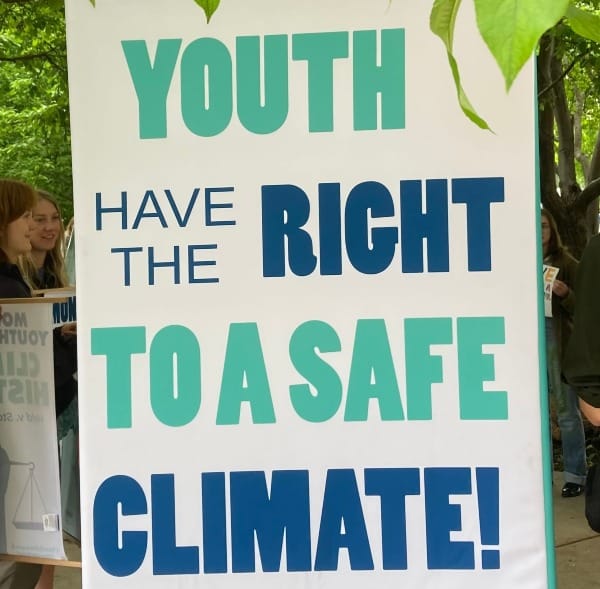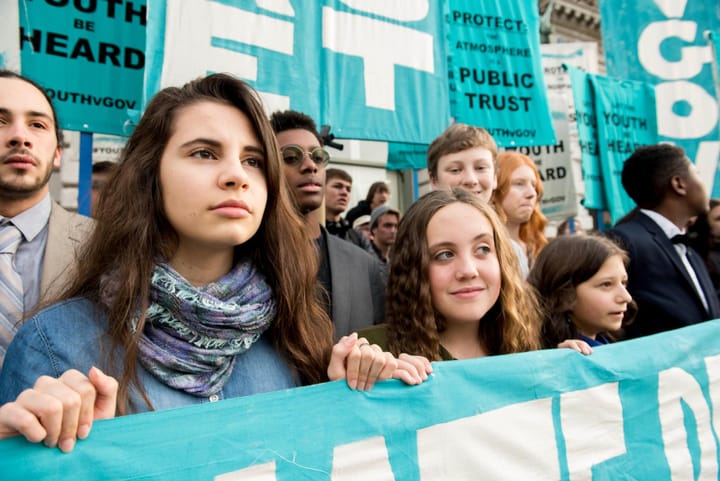Youth And Their Attorneys Push Back On Government Attempts To Avoid Accountability In US Climate Lawsuits

Attorneys representing young Americans in two separate constitutional climate lawsuits - one at the state level in Montana and the other against the federal government - have filed response briefs as government defendants in each case seek to evade accountability through the courts for policies and actions that exacerbate dangerous climate change.
In the Montana case, a trial court judge delivered a “historic” verdict last August in favor of the 16 youth plaintiffs suing their state government, finding a state policy that prohibits evaluation of greenhouse gas emissions and climate change in environmental reviews required during the permitting process to be unconstitutional. That ruling followed a landmark seven-day trial in June that saw climate scientists, medical professionals and other experts testify along with the youth plaintiffs, providing the court with clear and compelling evidence tying government-authorized climate pollution to harm to Montana’s environment and its young citizens. It was the first-ever trial in US history in a climate case brought by youth on constitutional grounds, and the judge’s verdict notably recognized that the right to a clean and healthful environment guaranteed under Montana’s constitution includes climate. The state defendants have appealed the ruling, currently pending before the Montana Supreme Court. In its challenge of the trial court’s verdict, the state does not refute the underlying facts of the case or does not even directly argue that the judge was wrong in finding the state’s policy unconstitutional. Instead, the state asserts the judge should not have been allowed to decide the case in the first place.
In the federal case, Juliana et al. v. United States, the 21 youth plaintiffs are fighting what their attorneys say is an “unprecedented” attempt by the government defendants to silence them and prevent their testimony and evidence from ever being heard at trial. This case challenges systemic government conduct that contributes to dangerous levels of GHG emissions and worsens the climate crisis, and last year a trial court judge in Oregon ruled that an amended and narrower version of the case could proceed to trial. But government defendants have turned to an appeals court in a last-ditch effort to quash the case before trial, using an extreme procedural maneuver called a “writ or mandamus” to bypass the standard course of litigation, including trial and subsequent appeals. This is the seventh time overall that the government has resorted to this tactic in this case, setting it apart from all other cases in which the US government is a defendant. Youth plaintiffs’ attorneys and other legal experts backing them say this behavior is an “abuse of power.”
Our Children’s Trust, an Oregon-based nonprofit law firm representing young people in constitutional climate litigation, is now pushing back against government defendants’ attempts to reverse the trial court decision in the Montana case, and to avoid trial at all costs in the federal Juliana case.
Youth Respond to State’s Appeal of “Landmark Victory” in Montana
The trial and district court verdict last summer in Held et al. v. State of Montana marked the first time in the US that a government had been held accountable through the courts under constitutional provisions for actions that contribute to the climate crisis. District Court Judge Kathy Seeley concluded in her August 14, 2023 order that the state’s policy barring consideration of climate impacts in environmental reviews under the Montana Environmental Policy Act (MEPA) violated youth plaintiffs’ constitutional right to a clean and healthful environment, noting that this right “includes climate as part of the environmental life-support system.” Seeley’s order struck down the anti-climate policy, which she termed the “MEPA limitation.”
The Montana government defendants submitted their opening brief on appeal in February, in which they argue the youth plaintiffs did not have “standing” or permission to sue because the policy at issue is merely procedural and could not substantively cause climate harms; invalidating the policy, they further argue, would not solve global climate change.

In a response brief filed on March 13, attorneys for the Montana youth contend that Seeley was correct in finding the plaintiffs had established standing. The MEPA limitation requires state agencies to turn a blind eye to the GHG emissions and climate impacts of fossil fuel projects, shielding them from public scrutiny, and this does in turn contribute to these projects advancing through the permitting process and ultimately creating harmful emissions. As the brief argues, “this case is not about the impacts of climate change writ large, but rather about how Montana’s environment and natural resources, and Montana’s children and youth, are being harmed by Defendants’ actions that cause and contribute to climate harms within Montana.”
The youths’ attorneys essentially say that Seeley’s decision, not only on the standing question but also on finding the MEPA limitation unconstitutional, was correct, and they urge the state Supreme Court to uphold the verdict. “These sixteen youth Plaintiffs are relying on this Court to confirm what they have learned in school: there are three branches of government, and when the political branches violate their fundamental constitutional rights, they can trust an independent judiciary to safeguard their rights,” the response brief concludes.
Several of the youth plaintiffs called out their state government for attempting to escape accountability and deny them their constitutional right to a clean and healthful environment.
“Today, on my 18th birthday, Montanans’ wellbeing and access to a healthy environment is worsening, while Defendants repeatedly attempt to bog us down, avoid accountability for their actions, and continue with business as usual,” plaintiff Eva L. said in a statement issued on March 13.
“We achieved a landmark victory and now the state is failing to make a sound legal argument in its appeal while still actively fighting against our right to a livable planet,” added lead plaintiff Rikki Held.
Supporters of the Montana youth filing amici or friend of the court briefs include former Montana Supreme Court justices, constitutional and environmental law professors, children’s rights advocates, tribal and conservation groups, public health experts and doctors, members of the outdoor recreation industry, and others. Amici briefs backing the state’s appeal came from conservative political and business interests and extractive industries.
In a statement, Our Children’s Trust, which spearheaded the Montana case, said the district court ultimately made the right decision and that the weight of the evidence is on the plaintiffs’ side. “The District Court correctly found, after a seven-day trial, Defendants are violating Plaintiffs’ fundamental constitutional rights, including their right to a clean and healthful environment,” said Nate Bellinger, senior staff attorney with Our Children’s Trust. “We are confident that after the Supreme Court reviews the extensive trial record, including the testimony from Plaintiffs and experts, it will come to the same conclusion and uphold the District Court’s ruling.”
US Government “Not Above the Law”
Meanwhile, federal government defendants in the Juliana v. US climate case are similarly arguing that the trial court lacks authority to decide the case. But unlike the Montana case that went through the normal course of litigation, including trial and now a final appeal, the federal case has been bogged down by relentless and unprecedented attempts by the government to evade a trial. Since the Juliana lawsuit was first filed in 2015, government lawyers with the US Department of Justice (DOJ) have made 22 attempts across three presidential administrations to stop the case, according to Our Children’s Trust.
In a March 21 filing with the Ninth Circuit Court of Appeals, Our Children’s Trust attorneys representing the 21 youth plaintiffs in Juliana responded to DOJ’s latest bid to terminate the case before trial. DOJ filed what’s called a ‘petition for a writ of mandamus’ with the Ninth Circuit in February - an extreme and extraordinarily rare tactic to override the decision or action of a lower court, typically reserved only for emergency situations. Despite the gravity of the unfolding climate emergency, the US government appears to consider having to defend itself at trial and face evidence of its role in fueling climate breakdown as the real emergency, as DOJ’s February petition is its seventh overall mandamus petition in this single case. This repetitious pattern, legal experts say, is unheard of in American civil litigation.
"To file again and again and again for writs of mandamus to keep any evidence at all from being heard is an abuse of power. The plaintiffs have a case to make. Let them make it,” Barbara Bennett Woodhouse, a distinguished professor emeritus at Emory School of Law, said in a statement.
Most of DOJ’s previous mandamus petitions, including two to the US Supreme Court, came during the Trump administration in 2018, the year that Juliana was supposed to go to trial. The Ninth Circuit Court rejected several mandamus petitions from DOJ in this case in 2018, a fact that Our Children’s Trust attorneys point to in their new filing with that Court.
The Ninth Circuit “reluctantly” decided in a divided 2-1 opinion in January 2020 that the case should be dismissed, citing concerns that courts could not grant the requested remedy ordering the government to develop a climate recovery plan. But that decision was made in an early appeal (called an ‘interlocutory appeal’), not in a mandamus request, and OCT attorneys argue that DOJ is improperly treating its latest mandamus petition as if it were another appeal. The trial court judge did not “clearly err” in allowing plaintiffs to revise their original complaint to try to cure the redressability issue that was the only basis for the Ninth Circuit’s 2020 dismissal decision, they further argue. Last year, US District Judge Ann Aiken decided the case should proceed to trial under the narrower, revised version of plaintiffs’ complaint, which now seeks only declaratory relief - a court declaration that the government’s policies and practices promoting fossil fuels amounts to violations of youths’ fundamental rights (to life, liberty, and property) under the US Constitution.
The case was back on track to proceed to trial before the DOJ filed its latest mandamus petition along with a request to pause proceedings, called a “stay,” which the Ninth Circuit Court recently denied. The Court also ordered the youth plaintiffs’ attorneys to respond to DOJ’s petition.
“While they would strongly prefer not to stand trial and await an appeal after final judgment, Defendants are not above the law,” the attorneys with Our Children’s Trust conclude in their response brief.
The fate of this landmark climate change lawsuit against the US government now rests in the hands of the Ninth Circuit appeals court. If that court denies the government’s petition, government lawyers could potentially turn to the US Supreme Court. Supporters of the Juliana youth plaintiffs have sent more than 47,000 emails in recent weeks to President Biden and his administration demanding an end to DOJ’s aggressive tactics to kill the case before trial. An in-person rally to amplify the call to let the youth be head in court is planned for April 21 in Washington DC.
“Youth are fighting for their lives, quite literally,” Julia Olson, founder and chief legal counsel at Our Children’s Trust, said in a statement. “This is the last opportunity for the Court of Appeals to rule that these youth—whose physical and mental health is threatened by wildfires, extreme heat and floods—deserve to be heard. The fact that the DOJ has gone to such outrageous lengths to silence them points to the gravity of what they have to say.”
“We filed the lawsuit because we saw the state of our planet and our climate, knowing that if the government continued contributing to climate change it would get worse,” plaintiff Miko Vergun said. “Our trial dates have been taken away from us multiple times and each year our climate stability gets worse. We can no longer wait. We need to go to court.”


